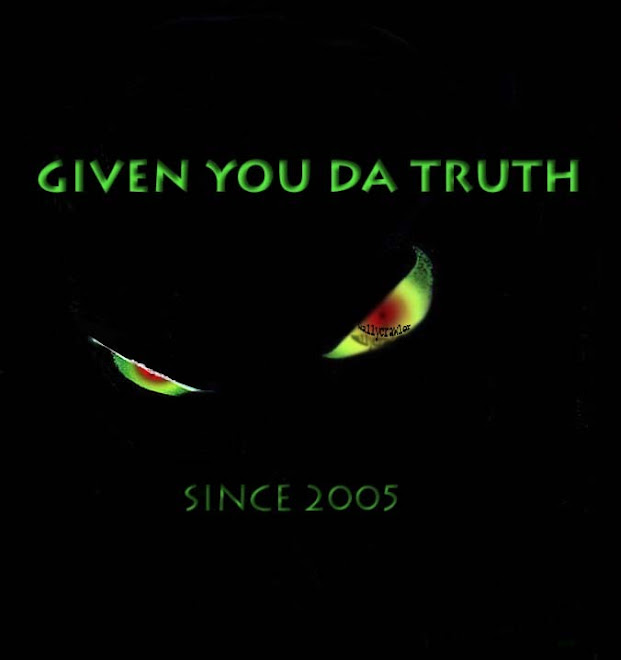I'm often asked by Leaf fans in da GTA (Greater Toronto Area)
and I tell them this story:

Maple Leaf Gardens Sex Scandal
John McCarthy can still recall the day in 1979 when he first saw the burly figure of Gordon Stuckless skating effortlessly around an outdoor rink near Toronto's Regent Park. McCarthy, an impressionable 14-year-old at the time, had lost his father the year before, leaving his mother to raise a family of six children in the low-income housing complex. When the hockey-crazed teenager played with his team, the St. Paul's Panthers, he wore black-and-orange socks with holes in them and battered hand-me-down skates with thickly taped toes. Perhaps it was the lanky kid's vulnerability that prompted Stuckless to approach him with an irresistible offer - an invitation to visit nearby Maple Leaf Gardens, where he then worked as a part-time maintenance man. As McCarthy recalls it, Stuckless was soon giving him tickets to hockey games and rock concerts. But the price, McCarthy says, would be tragically high. Over the next 10 years, he alleges, Stuckless and two other men who were also working at the Gardens would often take him into empty offices and have anal and oral sex with him. "It happened hundreds of times," says McCarthy. "And a lot of people working there knew about it."
Part of the reason they knew, McCarthy told Maclean's, was because his case was far from unusual. The same tactics were used to lure dozens of other young boys into having sex with Gardens' employees, he says. Sometimes, he remembers, the star-struck kids even received invitations to the Toronto Maple Leafs' dressing room, where they were introduced to their hockey heroes. For years, the victims kept the Gardens' secret. But in January, Toronto native Martin Kruze, 34, became the first to blow the whistle, leading to the arrests late last month of Stuckless, 47, and John Paul Roby, 54, a part-time usher for 25 years. Both were charged with gross indecency and indecent assault. Police said George Hannah, a longtime equipment manager with the Toronto Marlboros who died in 1984, was also involved. Almost immediately after the arrests, police were inundated with calls from others who said they too had been abused at the venerable hockey shrine. By the end of last week, the number had reached more than 60 men - and two women. An ebullient Kruze called the deluge of allegations "wonderful - this has been the best week of my life."
As the scandal widened, the question lingered as to why no one in authority at the Gardens seemed to know - or care - about what went on in the back rooms. Last week, Det. Dave Tredrea of the Metropolitan Toronto Police said the abuse was "common knowledge among the staff." So far, Tredrea added, there is no indication that senior management was aware of the problem. But McCarthy says that Harold Ballard, the Gardens' autocratic owner from 1971 until his death in 1990, would often walk by as Hannah and a group of kids sat watching TV together - or were coming out of the team sauna naked. Even though the teens had no particular reason for being in the building, no one in charge asked any questions. And he never complained, he says, because Hannah and Stuckless made him feel important: "They made me feel like I was Harold Ballard's son. I could bring my friends in anytime I wanted."
To ensure that his favorite boys were always nearby, Hannah even found them jobs at the rink. McCarthy first worked as an usher and attendant selling pop and hotdogs. In 1980, Hannah got him a coveted job as a stick boy for the Toronto Toros of the now-defunct World Hockey Association. Even today, claims McCarthy, some of the people still working at the Gardens were given their start by Hannah in exchange for sex. "They are still there," he said. "They know who they are."
Both McCarthy and Kruze turned to drugs and alcohol to cope with guilt and depression that they say were caused by the abuse. McCarthy also fell into a life of petty crime, and is now finishing a short sentence in an Ontario provincial jail for stealing money from a parking meter. Like Kruze, McCarthy believes his life was destroyed by Stuckless, Hannah and Roby, and he is determined to demand compensation from the Gardens after he is released. "I think I'm owed something," McCarthy says.
That issue will no doubt haunt Gardens owner and chief executive officer Steve Stavro. In 1993, lawyers representing Kruze approached the Gardens demanding $1.75 million in compensation; Kruze settled for $60,000 in 1995 in a deal that also included a confidentiality agreement. Maple Leafs president Cliff Fletcher said the Gardens' insurance company, Royal Insurance Canada, investigated Kruze's original allegations promptly, but concluded that the assaults were isolated incidents. The Gardens' board of directors decided not to go to the police, Fletcher said, because Kruze wanted to remain anonymous. "They chose the civil route," said Fletcher. "They wanted cash out of it. They did not want to go to the police."
Kruze said he changed his mind about going public after the January conviction of Graham James of the Swift Current Broncos. The longtime coach was found guilty of sexually assaulting two of his teenage players in the 1980s, one of whom, Sheldon Kennedy - now a Boston Bruin - told his story openly to the media. Kruze's own graphic descriptions included dozens of young boys lying naked on rugs having sex with Gardens employees. Just how many victims were there? At least one parent of an abused teenager alleges that Gardens officials had good reason to believe there were many - and that they simply were not vigilant enough.
Toronto businessman Barry Bingham and his son Darryl were flooded with bad memories when they saw Stuckless being led into court last month. When Darryl was 13, Stuckless was his hockey coach. On a team trip in 1987, Stuckless arranged to share a room with the boy - and sexually assaulted him. Darryl told his parents and they immediately went to police. In 1988, Stuckless pleaded guilty to assaulting the boy and received a short jail sentence. At the time of his arrest, he was on probation, after serving 14 months for sexual assaults involving several boys aged 12 to 13 in York Region north of Toronto in the early 1990s.
When Bingham realized in 1989 that Stuckless was still working at the Gardens, he wrote a letter to Donald Giffin, a longtime Gardens director who became president following Ballard's death. In no uncertain terms, Bingham warned Giffin that Stuckless was a convicted pedophile. Gardens officials then asked Stuckless to leave the Gardens. Bingham told Maclean's, however, that he was far from satisfied when he received a reply from Gardens officials that simply thanked him for his correspondence. "I wish they had gone to the police," said Bingham. "Instead, they told me that Stuckless had paid his debt to society."
By last week, the Gardens' board of directors finally appeared to have recognized the gravity of the situation. In an emergency meeting led by Stavro, they agreed to take a number of aggressive steps, including reviewing the thoroughness of the insurance company's investigation, and offering counselling to all victims and employees. Still, the board refused to admit any responsibility - a fact that troubles both child welfare advocates and experts in corporate ethics.
The Children's Aid Society of Toronto operates a child-abuse registry, which contains the names of convicted sex offenders. If Giffin had entered Stuckless's name, his long record of abuse would have come up. And David Nitkin, president of EthicScan Canada Ltd., a Toronto consulting firm that advises corporations on ethics, said the Gardens should have had guidelines in place to encourage "whistle-blowers" to come forward. "Maple Leaf Gardens just does not have it right," said Nitkin. "There were problems in the place and management should have known about it."
And what of the Gardens' most public faces, the hockey players who created the arena's fabled mystique? For former Maple Leafs, the revelation that teenagers were being violated near their dressing room was almost impossible to believe. Defenceman Ian Turnbull, who left the team in 1980, said that players were not aware of the problem. But he noted that Ballard was a penny-pincher who would often give jobs to people willing to work for very little money, without knowing much about them. Red Kelly, the famed Leaf centre who coached the team during the 1970s, emphasized that problems arose at the Gardens when Ballard took over in 1971. While the previous owners had run the place with military precision, he noted, under Ballard "it was as if a bunch of pirates had taken over." And that, it seems, may have created the atmosphere that led to a Canadian tragedy. Maclean's Magazine 1997
Prologue: What's not written in this piece is... Martin Kruze committed suicide in 1999. He just couldn't come to grips with himself and what happened to him as a child. His adult life was a mess. He turned to drugs and just started to fall. He killed himself by jumping to his death on the Bloor Street Viaduct. The day Martin Kruze died was the day I said to myself that I'd never watch another hockey game at Maple Leaf Gardens and I didn't. The Toronto Maple Leaf organization, that happens to be owned primarily by The Ontario Teachers Union, if ya can believe that, covered up what they did to Martin Kruze and over 50 others boys! They swept these young men to the curb. Hey they were mostly poor kids from the hood, who cares, RIGHT!? Well that's it my fellows. I don't think most Torontonians or Leaf fans know anything about Martin Kruze and his fellow victims. And that's the way the Leaf office staff want it!
Under da rug!

Love Ya Guys.
Wallycrawler.






















